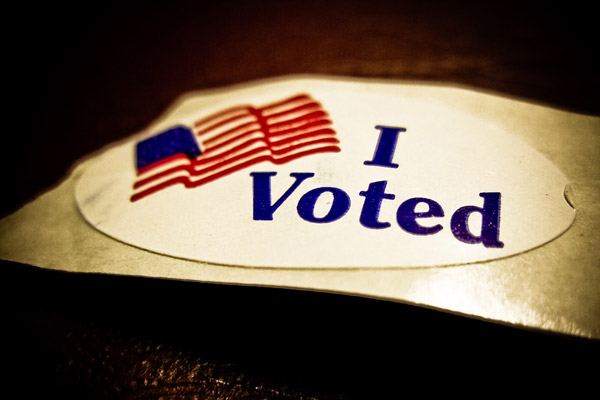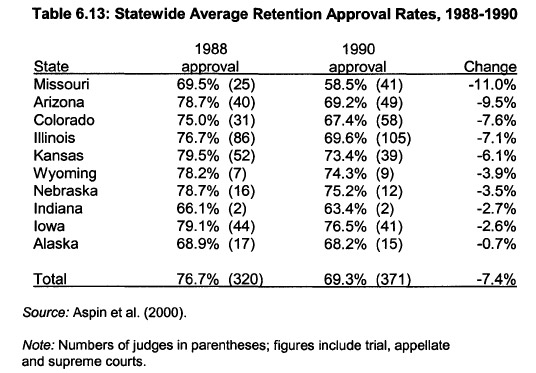
My column this month is about Chicago's collective inability to rid itself of unqualified judges, even ones that, in the context of our opaque and confusing judicial-retention system, would seem to be gimmies:
You’ve heard of Cynthia Brim, right? The 54-year-old Chicagoan made headlines last March when she was charged with misdemeanor battery for pushing one sheriff’s deputy and throwing her keys at another (a court-appointed psychiatrist declared her “legally insane” at the time). She has also racked up 18 years of near-universal negative ratings for performance at her job: judge for the Circuit Court of Cook County. Yet last November, nearly 64 percent of voters chose to retain her.
The day after the election, Brim was back in court (on the battery charges).
There are a lot of reasons for this, among them that there are just a lot of judges. No one I know, including myself, goes into the voting booth with a confident amount of information about them, because it's not like we're reading about them day in and day out—they outnumber the pols, but the data about them doesn't. Even consciencious voters just take the recommendations of a handful of bar groups—which I trust, though the descriptions of the judges can be cryptic, and always come from anonymous sources—into the booth and crib off them.
Retention elections were actually the idea of a Northwestern law prof, Albert Kales, as a means to combat machine politics—a balance between accountability in the form of elections and judicial independence by avoiding direct, competitive elections. Not that Kales was a big fan of his own idea; he recognized that it was a bit of a kludge in the first place. Slating and the complexity of judicial elections ("ballot fatigue") has really eliminated the reformist benefits of the idea. Since 1990, no Cook County judge has been recalled; from 1964-1990, only eight judges were removed.
What happened in 1990? Seven judges were recalled, almost as many as have been removed in every other year combined. This didn't make it into the column because it's such a freakish outlier, but it's pretty interesting.
In 2002, Albert Klumpp, a research analyist at McDermott Will & Emery, wrote his Ph.D. dissertation on "Judicial Retention Elections in Cook County: Exercise of Democracy, or Exercise in Futility?" To my knowledge, it's the only in-depth study of judicial retention elections at the municipal level, despite their importance for the governments that do have them. 1990 was the depths of the Operation Greylord scandal, which saw multiple judges going to prison, but the Operation Greylord prosecutions stretched over several judicial elections.
So instead of local anti-incumbent sentiment driven by arguably the worst political scandal in the city's history, Klumpp credits national anti-incumbent sentiment driven by THRO: "Throw the Hypocritical Bastards Out," a quixotic nonprofit started by a retired Floridian financial planner, Jack Gargan. Gargan's campaign was literally anti-incumbent, directed against every Congressional incumbent in America, no matter their party, belief, or performance.
Gargan's campaign against everyone raised $500,000, as well as independent ad buys in almost 250 newspapers, to accompany endless media attention; the relentlessly anti-incumbent feelings it stirred are credited with bringing Ross Perot into the race, the only remotely competitive third-party candidate in recent decades. It didn't lead to that many incumbents getting kicked to the curb, but Klumpp makes an interesting case that Gargan's efforts, combined with otherwise general anti-incumbent sentiment in the electorate, dropped judicial retention approval rates across the country:

Illinois sets a higher bar than other states for retention: 60 percent. So a drop in retention approval in Illinois will put more judges at risk.
The 1990 retention election massacre was the result of an odd confluence of factors. But one aspect Klumpp found suggests a possible strategy for getting judges unelected in a heavily Democratic, slate-voting metropolis:
One of the co-chairs of the 1990 retention judges' campaign committee did, to his credit, correctly spot the increase in all-no voting, telling the Chicago Daily Law Bulletin that "the group of voters who voted straight 'no' was higher than ever before" (Rooney 1990a). He also singled out suburban voters for being most responsible for the shift. This would further support the notion of a relatively stronger response to the THRO campaign from conservative voters, given the higher numbers of conservative voters in the suburbs than in the city.
Recalls are rare, but they're also not as far from the precipice as you might think: just a few percentage points during any given election, waiting for a few nudges.
Photograph: Vox Efx (CC by 2.0)



